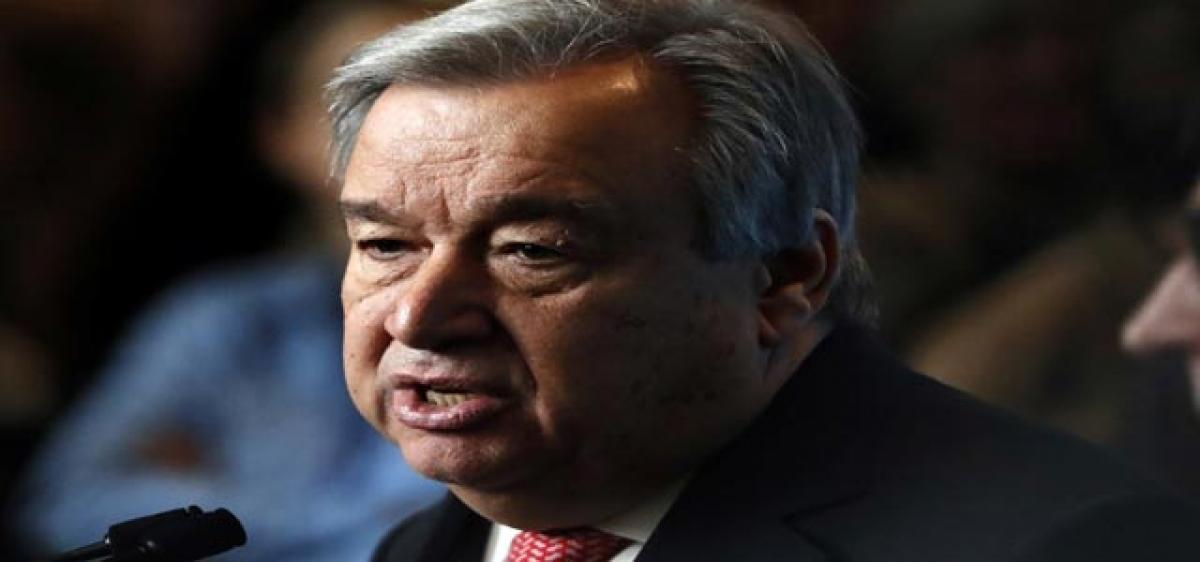Live
- Disenfranchisement of Muslims remark: K’taka Police summons seer for questioning on Dec 2
- Slovenia records highest unemployment rate in over 3 years
- How Indian Brands Are Driving the Net-Zero Mission on International ESG Day
- Centre okays Rs 4,969 crore package for fisheries sector
- New AI tool helps detect Alzheimer’s linked behaviours early
- IIT Bombay, DGH to foster R&D in decarbonising petroleum sector
- Office rentals rising steadily in top 10 Indian cities, Pune leads: Report
- Four killed as car over turnes
- Bank Holidays in December 2024: Banks in Telangana to be closed for 8 days
- Govt doubles down on addressing kids’ addiction to online games
Just In

US President-elect Donald Trump\'s controversial tweet on the 193-member UN comes at a time when former Portuguese Prime Minister Antonio Guterres has assumed office as its ninth Secretary General.
US President-elect Donald Trump's controversial tweet on the 193-member UN comes at a time when former Portuguese Prime Minister Antonio Guterres has assumed office as its ninth Secretary General. Trump questioned the United Nations' efficacy, calling it a "club of people to get together, talk and have a good time." In a previous tweet, Trump also cautioned that when he takes office, "things will be different at UN".
This tweet has brought out in open the vulnerability of the UN. It also speaks volumes of how one powerful nation, through its funding, can direct the functioning of the global body. There is widespread speculation that the Trump administration may defund the UN in whole or partially. The US contributes the highest share of 22 per cent to the UN budget.
Of the 193 member nations, the top 20 countries contributed a whopping 83.78 per cent, while 173 countries contribute 16.22 per cent of the $5.6 billion budget for 2016-17. Of these, the contribution of 135 countries is as low as 0.1 per cent. Interestingly, the top 10 contributors account for 68.89 per cent of the total funds received.
This proves how badly placed financially the UN today is. It is clearly an important area for the new Secretary General to free the UN from the supremacy of a superpower and build consensus to make every country equal at the UN table through an equal funding mechanism. The fundamental principle behind the global body is to ensure world peace. Unfortunately, people across the globe are facing serious issues of terrorism and human rights violations.
Where does the UN stand today to address these basic issues affecting global peace? Critics are asking one question: Is the UN behaving more as a NGO today than as a global peace broker? According to these critics, instead of focusing its attention on terrorism and rights violations, the UN's scattered humanitarian development engagement in different countries is weakening its position as an acceptable global body. There are specialised agencies, NGOs, who are closer to the communities and with better local development solutions to address local problems.
So, why should the UN enter these areas, the critics ask. The seriousness of the UN on terrorism can be explained with one recent example. The whole world knows that Jaish-e-Mohammed chief Masood Azhar is a global terrorist and operates from Pakistan to spread his terror activities in South Asia, particularly in India. But the global body failed to ban this person as a terrorist at the behest of China. The reason China has made every effort to hold back India's move is to please Pakistan for geostrategic reasons at the cost peace in the region. This move by China is helping terrorism to grow in the South Asian region. This is an area the new Secretary General should focus on.
Another daunting task for the new Secretary General is to take open criticism positively and implement reforms to make the UN more relevant as a global peace broker. Today there are about 1,200 country offices of the UN around the globe in 100 nations with more than 10 UN country offices in each country.
At these country offices, with a budget of $8-9 million and a staff of 5-6, 60 per cent of the resources go for operational expenses, leaving a small budget for programmes. Furthermore, many organisations within UN bodies have overlapping mandates. There are sectors such as water and energy and health in which more than 20 UN agencies are engaged and compete among themselves to tap the limited resources available.
On the positive side, be it the Haiti earthquake, the Ebola outbreak or the Indonesian tsunami, the UN has delivered its services efficiently. But will the new Secretary General look beyond an NGO prism and build up a structure to make the UN a vibrant body for combating natural disasters and a specialised body as a peace broker as it is doing so well in Central African Republic Mali and Lebanon?
By Sachi Satapathy

© 2024 Hyderabad Media House Limited/The Hans India. All rights reserved. Powered by hocalwire.com







